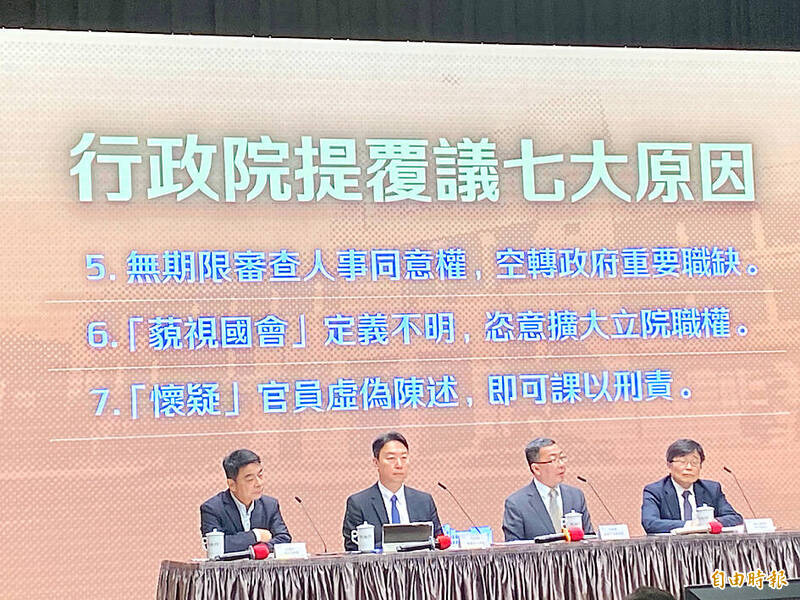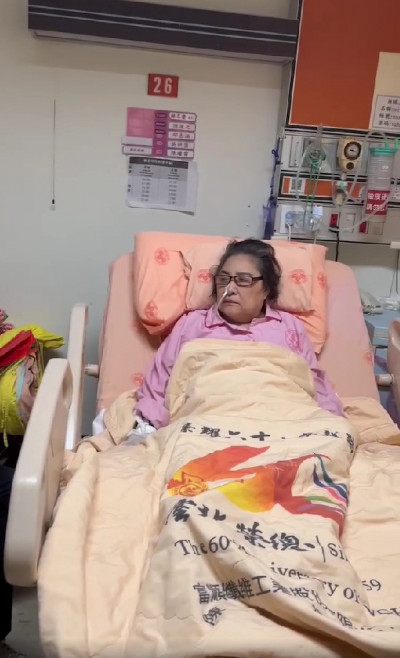《TAIPEI TIMES》 Cabinet to return reform bills to Legislative Yuan

Executive Yuan officials host a news conference in Taipei yesterday explaining why it has decided to send a set of reform bills back to the legislature to reconsider. Photo: Chung Li-hua, Taipei Times
CONTROVERSIAL: The measures in the reform bills are unconstitutional, and the deliberation that led up to its passage ‘violated democractic principles,’ a minister said
/ Staff writer, with CNA
The Executive Yuan yesterday decided to send controversial legislative reform bills back to lawmakers for reconsideration, pending approval from the president, saying they are unconstitutional and would be difficult to implement.
The Cabinet found the measures passed on Tuesday last week by Chinese Nationalist Party (KMT) and Taiwan People’s Party (TPP) lawmakers “difficult to implement,” Minister Without Portfolio Lin Ming-hsin (林明昕) told a news conference yesterday.
The Cabinet was preparing, pending the president’s approval, to request that lawmakers reconsider those revisions in accordance with Article 3-2 of the Additional Articles of the Constitution, he said.
Lin was referring to the measures that would give the legislature new investigative powers, the ability to hold hearings, and impose fines on public officials who refuse to attend a hearing or provide information, or lie.
Those measures contradicted past constitutional interpretations, which say the exercise of investigative and hearing powers must be restrained, Lin said.
Furthermore, the measures stipulate that public officials who fail to comply would be guilty of “contempt of the legislature” and subject to imprisonment, but does not clearly define what constitutes contempt, Lin said, adding that the punishments contravened constitutional principles of proportionality.
Lin said the amendments requiring the president to give an annual state of the nation address to the legislature and then take questions from the floor are unconstitutional, and are not in line with Taiwan’s system.
The deliberation that led up to the passage of the measures “lacked substantive discussions” and therefore “violated democratic principles,” Lin said.
Lin said the amendments to the Act Governing the Legislative Yuan’s Power (立法院職權行使法) and the Criminal Code were also approved through “unconstitutional procedures,” so those revisions, regardless of their justifiability, were unconstitutional.
The amendments seeking greater oversight of the president’s and Cabinet’s powers have caused brawls in the legislature and sparked heated debate in society over the past few weeks.
Although the Democratic Progressive Party (DPP) has vehemently opposed the revisions, it advocated for increased oversight of the executive branch while in opposition. However, it has sidelined the issue since coming to power in 2016.
The KMT and TPP maintain that the revisions have followed due process and are a necessary reform, in light of previous allegations of corruption in the government’s major policies and investment projects.
The Constitution states that if the Executive Yuan finds a bill passed by the Legislative Yuan difficult to execute, it can, with the president’s approval, request for the legislature’s reconsideration within 10 days of receiving the bill.
President William Lai (賴清德) would make a decision after a careful assessment, Presidential Office spokesperson Kuo Ya-hui (郭雅慧) said.
Within 15 days of receiving the Cabinet’s request, the legislature must vote on whether to uphold the passage of the bill. If it fails to reach a resolution within this period, the bill would become invalid.
The Cabinet’s decision was not meant to escalate conflict between the parties, Cabinet spokesperson Chen Shi-kai (陳世凱) cited Premier Cho Jung-tai (卓榮泰) as saying.
They hope that the legislature would re-examine the amendments and ensure they are aligned with the Constitution and national interests, Cabinet spokesperson Chen said.
Asked whether the Cabinet would take the case to the Constitutional Court, Lin only said it was “too early” to consider such a “hypothetical” question.
DPP lawmakers can also request a ruling from the Constitutional Court on the revisions’ constitutionality.
新聞來源:TAIPEI TIMES














